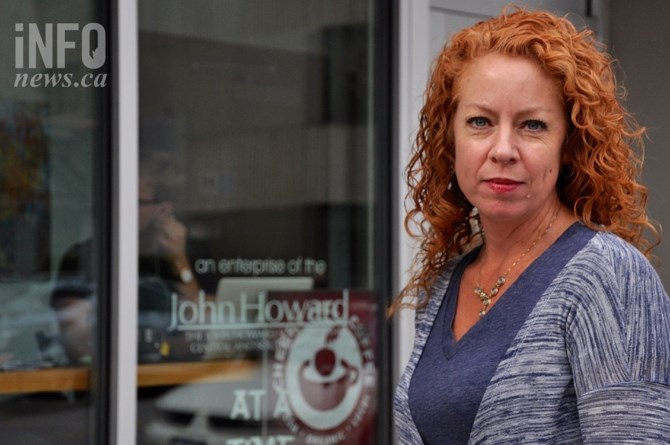
Gaelene Askeland of the John Howard Society.
(JOHN MCDONALD / iNFOnews.ca)
October 15, 2018 - 7:00 PM
KELOWNA - While most Kelowna residents can agree there is a desperate need for housing assistance for the homeless, addicts and people with mental illness, few people may agree to welcome them to their neighbourhood.
The latest battle is shaping up in the neighbourhood between Spall and Cooper roads where a 52-54 unit supportive housing project is planned by B.C. Housing for 2025 Agassiz Rd. On Saturday, 238 neighbourhood residents met to discuss the proposal and many were vocal opponents.
“We expect a large number of younger males with heroin addiction to be housed in that building,” neighbourhood spokesman Richard Taylor said today. “This is a neighbourhood where the biggest demographic is elderly widows who want to walk around the neighbourhood. I liken it to whether you would want to move a meth addict in with your grandmother.”
While the Agassiz Road group ramps up its efforts to stop the project, the John Howard Society, which will manage the apartment complex, has been through this before. It dealt with a massive public opposition to its Cardington Apartment complex a decade ago and hopes this opposition too, will be temporary.
“I wasn’t around then, but I heard it was very controversial and no one wanted it,” said John Howard Executive Director, Gaelene Askeland. “Within a few months that all died down and everyone has been supportive.”
The society’s Heartstone project on Commercial Avenue was resisted by neighbouring businesses but will open in about two weeks with 46 units. Last fall it was a 51-unit housing project for recovering addicts in Rutland to be run by Freedom’s Door that elicited strong opposition.
Taylor describes the Agassiz Road project as a “wet” facility, meaning that people can consume alcohol and drugs on site.
“That’s not a term anybody uses anymore,” Askeland said. “It is a harm reduction residential development. It’s an apartment like anywhere else.”
People in this project, as in any other apartment complex, can drink in their own home, she said.
If people are injecting drugs, they will be asked to do so in an area of the building where they can safely inject using clean needles. It is not a safe injection site per se, but will be equipped with medical supplies to avoid overdoses.
Clientele will be coming off the streets or out of precarious situations and will be screened so there is a balance between people with mental health issues vs drug and-or alcohol “misuse.”
There is a waiting list of some 1,200 people in Kelowna needing this kind of housing, Askeland said.
Taylor countered by pointing out the huge need for subsidized senior’s housing, which is also something B.C. Housing is mandated to provide.
Even before Saturday's event, Taylor and others sent letters to the municipal and provincial governments lobbying for reconsideration of the use of this property, one of their key suggestions being subsidized seniors housing.
While he supports the Journey Home strategy for eliminating homelessness, he says this is the wrong location for this facility because it has a much higher density of residential properties within 500 metres of the proposed building than any other similar project in the city.
“The only other site that could affect more residents would be if you put it on Sunset Drive,” he said.
Residents will continue to lobby B.C. Housing and government officials.
There will be a demonstration suite set up in the parking lot of the Ramada Hotel on Harvey Ave. on Nov. 7 from 2 to 8 p.m. then again on Nov. 8 from 9 a.m. to 1 p.m., followed by an open house from 5:30 to 8 p.m. explaining the project.
If all else fails, Taylor says residents are prepared to call for a judicial review of the land purchase.
The property was sold by the Ukrainian Orthodox Church to a developer for $1.35 million, he said. Nine months later it was sold to B.C. Housing for $2.6 million.
Another legal challenge could be launched on the terms of the original sale that, he said, called on the developer to register a restrictive covenant limiting any building to two storeys. That did not happen before it was sold to B.C. Housing.
“It could get bogged down in legal procedures and nothing is going to get built on there next year,” Taylor said.
His strata council has already approved money for a legal challenge. Taylor expects other strata councils to follow suit, if necessary.
The land also needs to be rezoned. While that process deals with form and character and not who lives in the building, Taylor hopes to convince city council not to rezone the land for the proposed supportive housing.
To contact a reporter for this story, email Rob Munro or call 250-808-0143 or email the editor. You can also submit photos, videos or news tips to the newsroom and be entered to win a monthly prize draw.
We welcome your comments and opinions on our stories but play nice. We won't censor or delete comments unless they contain off-topic statements or links, unnecessary vulgarity, false facts, spam or obviously fake profiles. If you have any concerns about what you see in comments, email the editor in the link above.
News from © iNFOnews, 2018